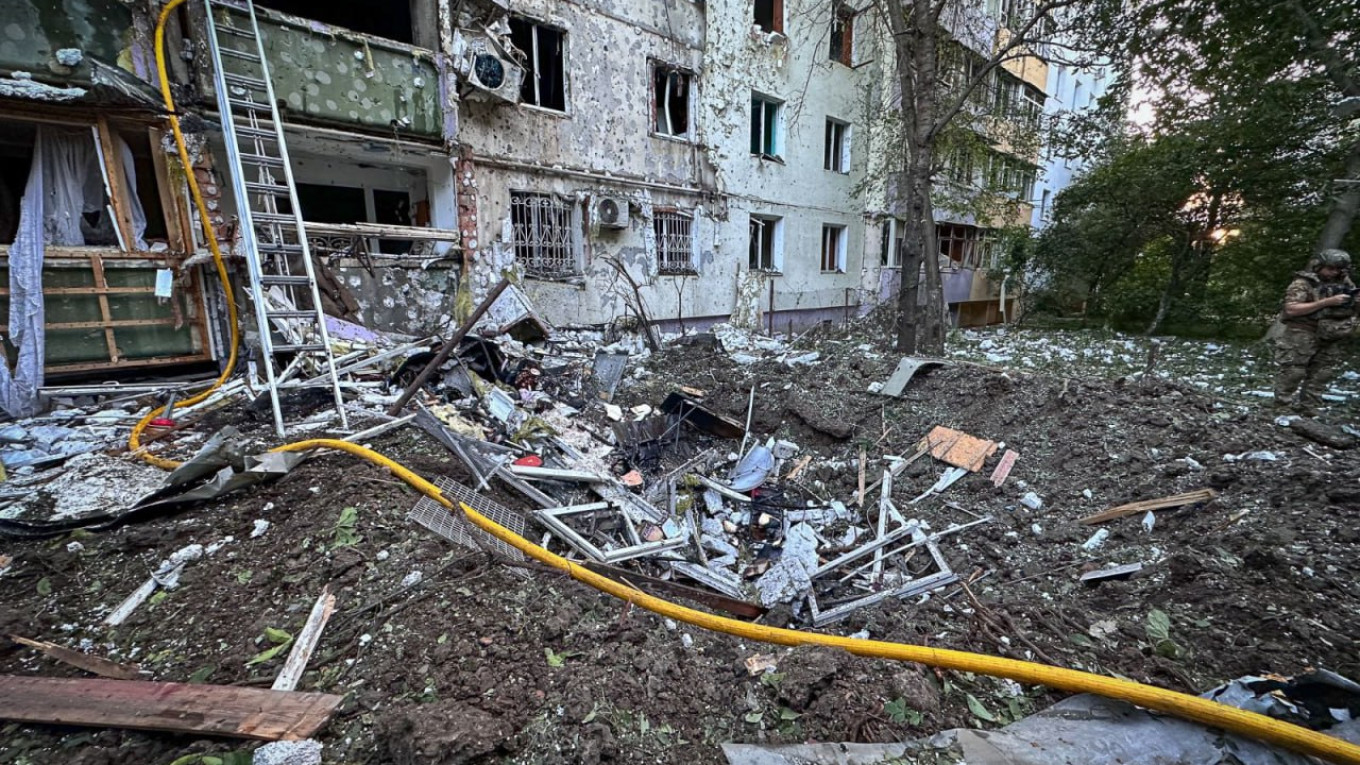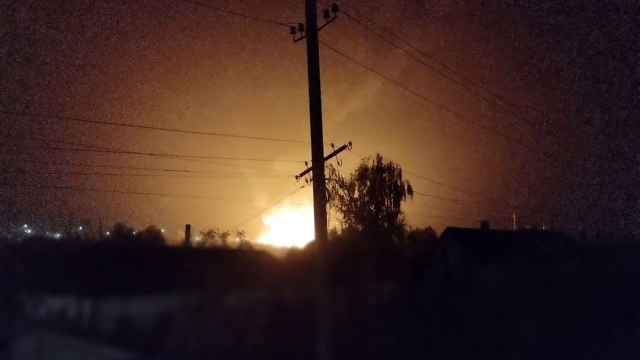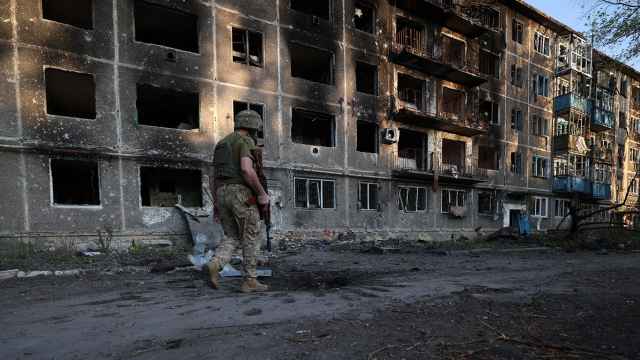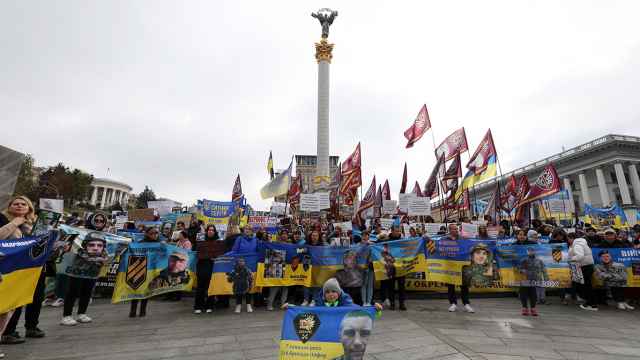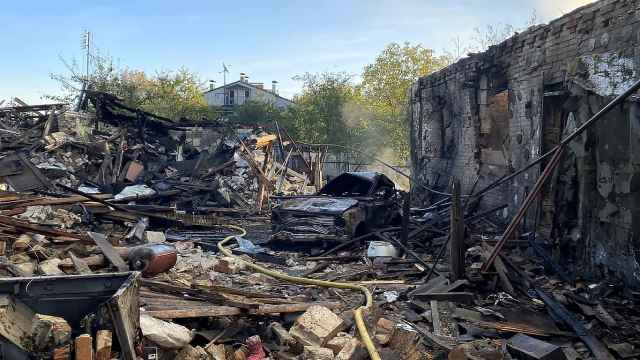Russia fired more than 620 drones and long-range missiles overnight, killing four people, Ukraine said Saturday, calling for fresh sanctions on Moscow to halt its record barrages.
Kyiv and Moscow have stepped up aerial strikes over recent months, and U.S.-led ceasefire talks aimed at pausing the over three-year war have stalled.
"Twenty-six cruise missiles and 597 attack drones were launched, of which more than half were 'Shaheds'," Ukrainian President Volodymyr Zelensky said, referring to Iranian-made drones.
The Ukrainian air force said it had downed 319 Shahed drones and 25 missiles, adding that one missile and about 20 drones hit "five locations." It did not elaborate.
Zelensky said the strikes had killed at least two people and wounded 20 in Chernivtsi in the west, far from the front lines of the east and south.
Six people were wounded in Lviv, also in the west, while in the east, two people died in the Dnipropetrovsk region and three were wounded in Kharkiv, local authorities said.
Russia also "dropped two guided aerial bombs on the homes of civilians" in the northeastern Sumy region, killing two, the local prosecutor's office said.
"As a result of the enemy attack, a 65-year-old man and his wife were killed. Fourteen residential buildings were destroyed and damaged," it added.
Russia's Defense Ministry said it had targeted companies in Ukraine's military-industrial complex in Lviv, Kharkiv and Lutsk and a military aerodrome.
On Friday, Ukrainian drone and shelling attacks killed three people in Russia.
U.S. special envoy Keith Kellogg is due on Monday to begin his latest visit to Ukraine as a Washington-led peace effort flounders.
On Friday, the Kremlin restated its opposition to a European peacekeeping force in Ukraine, after French President Emmanuel Macron said Kyiv's allies had a plan "ready to go in the hours after a ceasefire."
U.S. President Donald Trump called Russian counterpart Vladimir Putin on Thursday but said afterwards there had been no progress towards ending the war.
The Kremlin said Putin would not give up on Russia's war goals but would nonetheless continue to take part in negotiations.
Moscow says its aim in Ukraine is to get rid of the "root causes" of the conflict and has demanded that Kyiv give up its NATO ambitions.
In Russia's Belgorod region, which borders Ukraine, a drone "hit the Belgorod Arena sports center, where classes were taking place," regional governor Vyacheslav Gladkov said Saturday, adding there were no casualties.
He said a man died after a separate strike hit a house in the city of Shebekino.
Weapons, sanctions
Zelensky said on Thursday that Trump had given him firm dates for the resumption of U.S. weapons shipments and planned to make a statement on Russia on Monday.
Washington's announcement earlier this month that it would pause some armament deliveries to Ukraine was a blow to Kyiv, which is reliant on Western military support.
On Saturday, Zelensky urged his Western allies to send "more than just signals" to stop the war launched by Russia in February 2022.
"The pace of Russian air strikes requires swift decisions and it can be curbed right now through sanctions," he said.
Zelensky specifically demanded penalties for those who "help Russia produce drones and profit from oil."
Oil exports are important for the Russian economy, especially in the face of existing Western sanctions.
Sanctions imposed on Russia — the world's largest fertilizer producer — after the invasion spared its grain and fertilizer exports.
But prices skyrocketed, fuelling fears of food insecurity.
The United Nations signed a deal with Russia in July 2022 to facilitate exports of food and fertilizer to limit global price increases.
But on Friday, it said the accord would not be renewed when it expires on July 22.
Russia has repeatedly complained that the agreement does little to protect it from the effects of secondary sanctions.
A Message from The Moscow Times:
Dear readers,
We are facing unprecedented challenges. Russia's Prosecutor General's Office has designated The Moscow Times as an "undesirable" organization, criminalizing our work and putting our staff at risk of prosecution. This follows our earlier unjust labeling as a "foreign agent."
These actions are direct attempts to silence independent journalism in Russia. The authorities claim our work "discredits the decisions of the Russian leadership." We see things differently: we strive to provide accurate, unbiased reporting on Russia.
We, the journalists of The Moscow Times, refuse to be silenced. But to continue our work, we need your help.
Your support, no matter how small, makes a world of difference. If you can, please support us monthly starting from just $2. It's quick to set up, and every contribution makes a significant impact.
By supporting The Moscow Times, you're defending open, independent journalism in the face of repression. Thank you for standing with us.
Remind me later.


